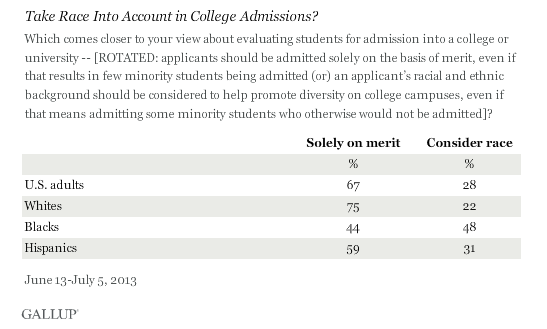Gallup’s most recent finding shows that more than two-thirds of Americans believe students applying to college should be evaluated “solely on merit” -- and that skin color should be wholly irrelevant during the admissions process (via Nick Gillespie):
I’m inclined to stand with the majority on this question. Of course this is not to belittle or ignore the nation’s long and complicated history of American race relations. For example, who among us can forget the famous photograph of Alabama Governor George Wallace standing defiantly at the University of Alabama’s auditorium in 1963 in order to prevent two black students, James Hood and Vivian Malone Jones, from registering for classes solely because of the color of their skin?
Institutionalized racism existed in this country -- in one form or another -- for more than a century after the Emancipation Proclamation was signed into law, and admittedly, exists to a certain extent in latent form today. At the same time, it’s my personal opinion that affirmative action and other such laws were once necessary -- namely, around the time the great Civil Rights statutes of the 1960s were signed into law. But remember, the reason the Supreme Court tossed out Section Four of the 1965 Voting Rights Act as recently as last month was because, in Chief Justice John Roberts’ opinion, “our country has changed.” In other words, antiquated laws crafted with the best of intentions fifty years ago -- in order to protect blacks against discrimination and exploitation -- are no longer necessary in twenty-first century America. Isn't this a good thing?
By the way, a question worth asking is do affirmative action laws actually help minority students succeed? Perhaps. But there’s also a preponderance of evidence suggesting otherwise. Here’s Dr. Thomas Sowell writing on the subject, a brilliant and accomplished academic who spent many years of his professional life studying these kinds of issues:
Recommended
My view of affirmative action in college admissions is that it mismatches black students with colleges whose standards they do not meet, leading to unnecessary failures, when these students are perfectly qualified to go to some other colleges where they are more likely to succeed and graduate.
Martin Luther King, Jr. famously remarked that he wanted to live in a nation where his children would not be judged “by the color of their skin but by the content of their character.” Racial quotas on college campuses therefore seem to be anathema to Dr. King’s vision of a more meritocratic and egalitarian society. Still, there will always be those who believe affirmative action is sacrosanct, and anyone wanting to change these entrenched laws or shake up the status quo are motivated only by racism. But isn’t it telling that nearly 70 percent of Americans already want students evaluated “solely on merit” when they apply to U.S. colleges and universities? This seems to me a huge step forward -- even if most liberals wouldn't agree.


























Join the conversation as a VIP Member